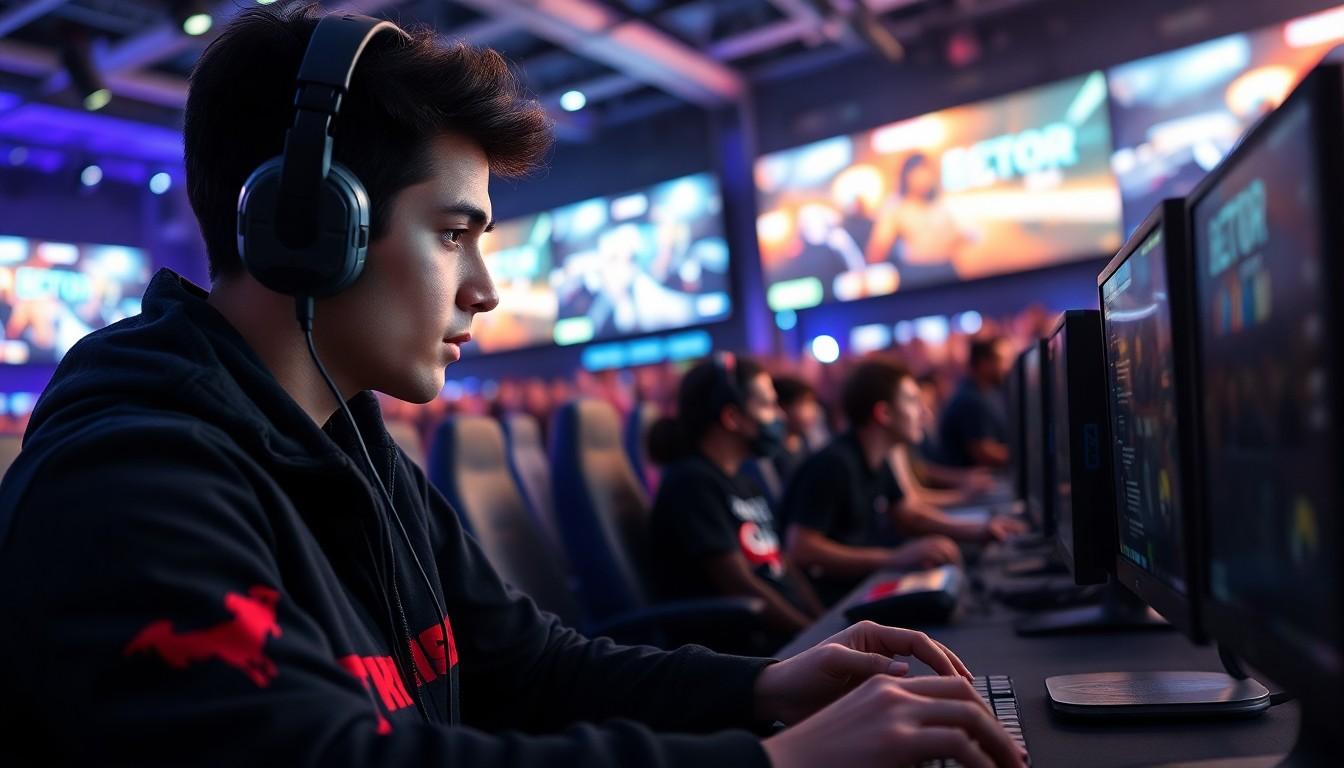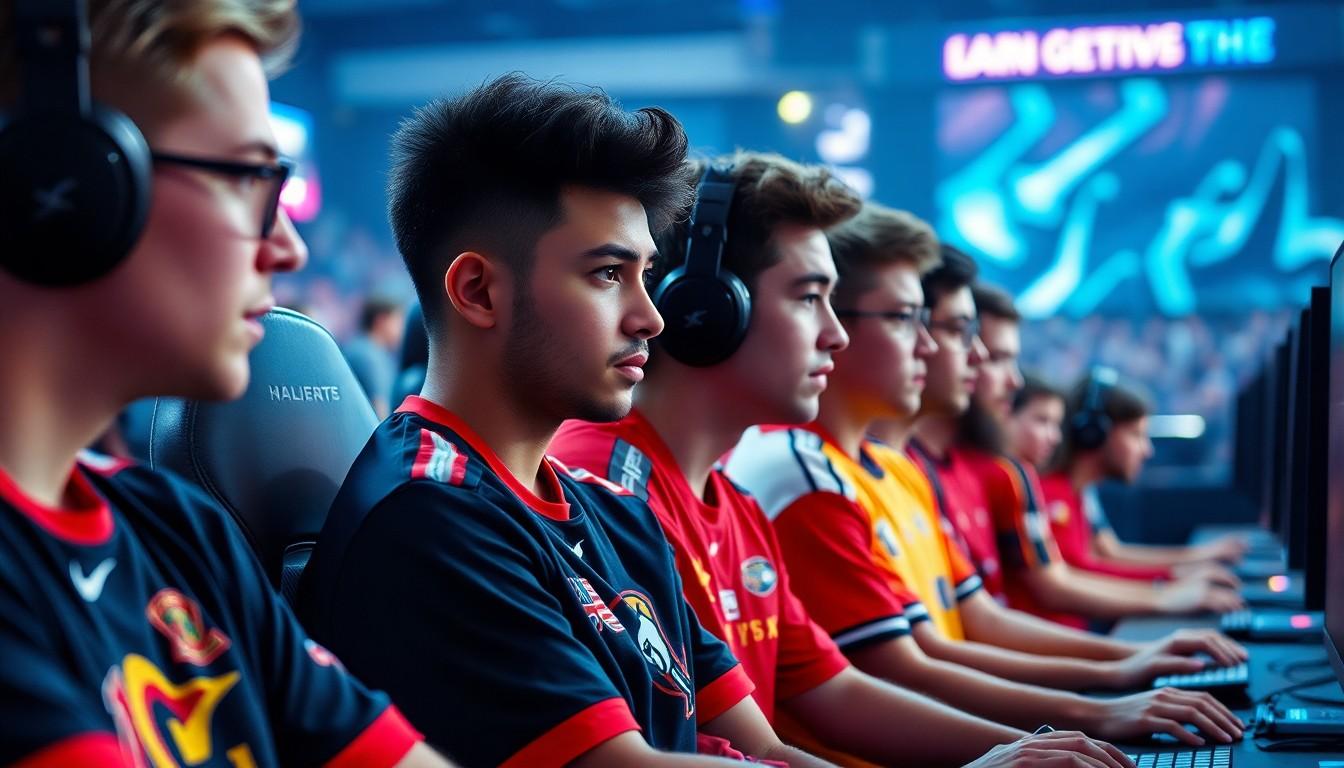Phone:
(701)814-6992
Physical address:
6296 Donnelly Plaza
Ratkeville, Bahamas.

In the electrifying world of esports, teams aren’t just groups of players; they’re legends in the making. With their dazzling skills and strategic prowess, these squads have turned gaming into a global spectacle, drawing fans from every corner of the planet. Who wouldn’t want to cheer for a team that can execute a perfect headshot while making it look as easy as pie?
Famous esports teams showcase exceptional talent and dedication. These squads compete across various titles, demonstrating their prowess in games like League of Legends, Dota 2, and Counter-Strike: Global Offensive. Teams such as Team Liquid and FaZe Clan have gained recognition for their consistent performances in tournaments, attracting millions of fans.
ROG Esports represents another notable contender. With several championship titles under its belt, it highlights the competitive nature of esports. Teams like Cloud9 and T1 have also established themselves, amassing a strong following and engaging audiences with thrilling gameplay.
The strategies employed by these teams often set them apart from their competitors. Strategic maneuvers combined with exceptional teamwork create memorable moments during matches. Organizations invest in training facilities and coaching staff, allowing players to refine their skills continuously.
International tournaments often feature these famous teams, showcasing top-tier competition. Fan engagement through social media and streaming platforms helps teams grow their brand and connect with supporters. Achievements in notable events, such as The International or the League of Legends World Championship, further solidify their legacy within the esports community.
Sponsorship deals play a significant role in the growth of famous esports teams. Financial backing from brands enhances their operational capabilities. Partnerships with gaming hardware companies help teams gain access to the latest technology, improving overall performance.
Recognition in the gaming industry continues to expand, bringing esports teams into the mainstream. Major companies and investors recognize the potential for growth and profitability, leading to increased support for these organizations.

Esports teams excel within different game genres, showcasing unique strategies and skills. Below are notable teams categorized by their primary genre.
Teams like FaZe Clan and Team Liquid dominate the first-person shooter scene. Competitive titles such as Call of Duty and Counter-Strike: Global Offensive highlight their skills. FaZe Clan, known for its aggressive playstyle, consistently ranks among the top in various tournaments. Team Liquid combines strategic gameplay with exceptional teamwork to secure numerous championship titles. Each team focuses on rigorous training and game analysis, enhancing performance in high-stakes environments.
In the realm of multiplayer online battle arenas, organizations like T1 and Cloud9 stand out. T1, recognized for its professionalism in League of Legends, has earned multiple championships, cementing its legacy. Cloud9, with a diverse roster, showcases versatility across numerous genres, excelling in League of Legends and other competitive titles. These teams prioritize effective communication and coordination, essential for success in fast-paced matches where every decision counts.
Notable teams in real-time strategy games include Evil Geniuses and Team Secret. Evil Geniuses has made a name for itself in Dota 2, winning prestigious tournaments like The International. Team Secret consistently delivers impressive performances with its coordinated strategies and adaptability during matches. These teams emphasize in-depth game knowledge and precise execution, allowing them to outmaneuver opponents effectively. Their focus on research and development keeps them competitive in an ever-evolving environment.
Esports teams have gained immense popularity over the years, transforming competitive gaming into a global phenomenon. Their evolution has redefined the gaming landscape, contributing to significant milestones along the way.
Key moments marked the rise of esports teams. The release of competitive games, such as Counter-Strike 1.6, set the stage for formal tournaments in the early 2000s. Major League Gaming, established in 2002, helped organize competitive events. The introduction of streaming platforms like Twitch in 2011 revolutionized how fans engaged with these competitions. Teams such as SK Telecom T1 emerged, shaping the future of esports through consistent championship wins. Success in tournaments like The International has further cemented these milestones. Players and organizations alike benefited from substantial prize pools, which incentivized skill and dedication. Milestones like these laid the foundation for the professional esports industry we see today.
Esports teams have profoundly influenced the gaming community. They foster a sense of belonging among fans, creating vibrant online and offline communities. Players develop strong connections with fans through social media engagement and streaming interactions. Esports organizations often host local tournaments, encouraging grassroot participation and enhancing community ties. Increased visibility of professional players has sparked interest in competitive gaming, inspiring new generations to pursue careers in esports. The presence of sponsorship deals enriches the community through financial investment and access to resources. Clubs often support content creation, further engaging fans and promoting the overall growth of esports.
Esports teams gain recognition not only through their collective strategies but also through individual players who showcase exceptional talent and skill. Understanding the contributions of these players helps highlight their importance in competitive gaming.
Top players often bring unique strengths to their teams. They influence game strategies with innovative tactics, shaping the flow of play during crucial moments. A player’s leadership can inspire teammates to elevate their performance, while individual mechanics, such as sharpshooting or exceptional map awareness, make substantial differences in matches. For example, players like s1mple from Natus Vincere consistently deliver clutch plays in Counter-Strike: Global Offensive, while Faker from T1 demonstrates unmatched skill in League of Legends. Their ability to perform under pressure defines key turning points in numerous tournaments.
Individual achievements often mirror the success of their teams. Some players accumulate numerous accolades, including Most Valuable Player (MVP) titles in major events. To illustrate, the Dota 2 scene showcases players like N0tail and Ana from OG, both recognized for leading their teams to The International victories. Their contributions led to groundbreaking tournament achievements and set new standards in competitive play. Additionally, players can earn awards based on kill-death ratios, assists, and other statistical milestones, further establishing their legacies within the esports community. Recognition from tournaments enhances the players’ profiles and the visibility of their teams.
The future of famous esports teams shows promising potential. As the landscape evolves, new teams are emerging, bringing fresh talent and innovative strategies to the forefront.
Organizations like G2 Esports and 100 Thieves are gaining traction within the competitive scene. Both teams have quickly established strong identities by attracting skilled players and engaging fan bases. The continued rise of CS:GO and Valorant has created opportunities for these teams to showcase their capabilities. Notably, G2 Esports has gained recognition for its entertaining approach to gameplay. Similarly, 100 Thieves combines gaming with lifestyle branding to connect with a broader audience. As new competitions launch, emerging teams are poised to disrupt established powerhouses.
Predictions suggest a significant expansion of the esports market. Insights indicate that revenues from esports could surpass $1.5 billion by 2023. Major companies continue to invest, enhancing training facilities and recruiting top talent. As streaming platforms grow, more fans engage with their favorite teams. The influx of sponsorship deals will likely fuel operational growth. Traditional sports franchises are increasingly acquiring esports teams, bridging gaps between industries. Enhanced viewer experiences during tournaments will likely draw in larger audiences. Consequently, established teams alongside emerging ones will thrive, further solidifying esports as a mainstream entertainment medium.
The world of esports continues to thrive as famous teams redefine competitive gaming. Their remarkable achievements and strategic prowess captivate fans and inspire new players. As these teams evolve and adapt, they solidify their positions within the gaming industry while attracting substantial investments and sponsorships.
The future looks bright for esports, with emerging organizations and innovative strategies poised to take the spotlight. As fan engagement grows through streaming and social media, the popularity of esports teams will only increase. Their influence on the gaming community fosters a vibrant culture, ensuring that competitive gaming remains a dynamic and integral part of the entertainment landscape.